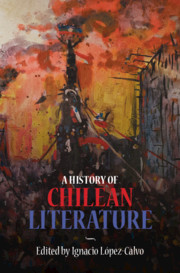Book contents
- A History of Chilean Literature
- A History of Chilean Literature
- Copyright page
- Dedication
- Contents
- Figures
- Contributors
- Acknowledgments
- Introduction
- Part I Proto-Chilean, Colonial Chronicles and Letters
- Part II Nineteenth-Century Articulations of an Embryonic National Consciousness
- Chapter 6 Rosario Orrego Castañeda (1831/4–1879) and the Proto-Feminist Writing Scene
- Chapter 7 The Feuilleton Tradition
- Chapter 8 The Historical Novel
- Chapter 9 From the Public to the Private
- Chapter 10 Literature and Literary Markets
- Chapter 11 Modernization and Culture
- Part III Beyond Chileanness: Heterogeneity and Transculturation in Canonical and Peripheral Twentieth- and Twenty-First-Century Literature
- Index
- References
Chapter 9 - From the Public to the Private
Autobiographies, Collections of Letters, Memoirs, and Diaries as Intimate Descriptions of the Formation of the Republic
from Part II - Nineteenth-Century Articulations of an Embryonic National Consciousness
Published online by Cambridge University Press: 27 September 2021
- A History of Chilean Literature
- A History of Chilean Literature
- Copyright page
- Dedication
- Contents
- Figures
- Contributors
- Acknowledgments
- Introduction
- Part I Proto-Chilean, Colonial Chronicles and Letters
- Part II Nineteenth-Century Articulations of an Embryonic National Consciousness
- Chapter 6 Rosario Orrego Castañeda (1831/4–1879) and the Proto-Feminist Writing Scene
- Chapter 7 The Feuilleton Tradition
- Chapter 8 The Historical Novel
- Chapter 9 From the Public to the Private
- Chapter 10 Literature and Literary Markets
- Chapter 11 Modernization and Culture
- Part III Beyond Chileanness: Heterogeneity and Transculturation in Canonical and Peripheral Twentieth- and Twenty-First-Century Literature
- Index
- References
Summary
The declaration of Independence on September 18, 1810 was the prelude to a series of changes that unfolded in Chile throughout the nineteenth century: following the initial revolution of Independence, the newly victorious patriots were defeated in Rancagua by pro-Spanish forces, who reinstated the Iberian regime. Years later, in 1818, continuous conflict led to the Battle of Maipú and the final victory of the Independence movement. The long-lived confrontation had startling consequences for the population of the time, who stirred from its apparent colonial dream. Shootings, crossings from either side of the cordillera, exile, and banishment were the visible effects of an agitated time that would continue to escalate to social and political agitation and civil war.
- Type
- Chapter
- Information
- A History of Chilean Literature , pp. 177 - 196Publisher: Cambridge University PressPrint publication year: 2021



